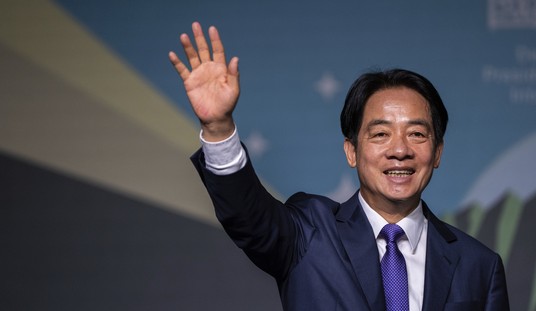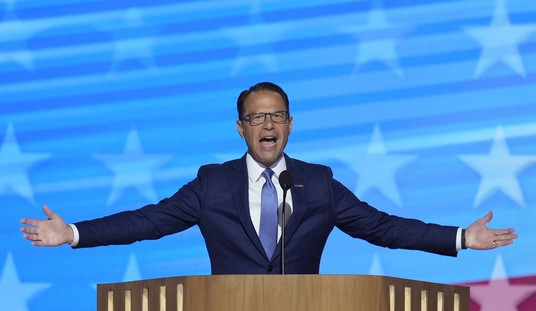Did Beijing botch a coup attempt in Pyongyang due to a high-ranking North Korean mole? This report from Sky News may explain why pressure from China hasn’t done much to rein in Kim Jong-un, and also why Kim resorted to a high-stakes assassination earlier this year in Kuala Lumpur. Not long after taking power, Kim’s uncle Jang Song Thaek tried to get him knocked off in favor of Kim Jong-nam, a plot that ended badly for both:
According to Japan’s Nikkei Asian Review magazine, Jang met with China’s then-president Hu Jintao in Beijing less than a year after Kim replaced his late father as North Korea’s leader.
The publication claims Jang proposed toppling the young ruler, with Beijing’s help, in favour of Kim’s elder half-brother.
But he did not get a clear answer from the Chinese leader who was dealing with his own problems at home, the report states.
An ally of Kim within the Chinese government, Zhou Yongkang, later secretly informed him of the coup plot, on which the dictator is said to have flown into a rage.
This is certainly a better explanation for Jang’s abrupt fall from grace than merely the outcome of a drunken rage by Dear Leader. Only a few months earlier, Jang seemed ascendant in the new dictator’s regime, having been rehabilitated enough to get a political ally appointed to a significant post. Pak Pong-ju was supposed to help promote “reform,” of which precious little has been in evidence, but he’s still in those positions, which suggests that Jang’s offense was personal to Kim — and a coup plot might qualify.
The manner of Jang’s execution makes that theory even more plausible, although there is some dispute over this account. The Chinese media reported that Jang and his associates met their end by getting eaten by wild dogs:
Kim Jong-un’s uncle was killed after being stripped naked and fed to a pack of hungry dogs, according to reports in a Chinese state-backed newspaper.
North Korea has already described Jang Song Thaek as “despicable human scum, worse than a dog,” but the report, which appears in Hong Kong’s Wen Wei Po newspaper, suggests he may have met his end in the jaws of dogs.
The account – which cannot be verified – describes how Jang Song Thaek and five of his aides were stripped naked and fed to 120 hungry hounds, who had been starved for three days. The whole process lasted is reported to have lasted an hour, and as they were eaten, hundreds of officials watched.
The New York Times reported contemporaneously that Kim used anti-aircraft weapons rather than dogs to kill Jang’s associates. However, they also pointed to a turf war as the proximate cause at the time:
During a closed-door meeting on Monday of the South Korean National Assembly’s intelligence committee, Nam Jae-joon, the director of the National Intelligence Service, disputed the North’s assertion that Mr. Jang had tried to usurp his nephew’s power. Rather, he said, Mr. Jang and his associates had provoked the enmity of rivals within the North’s elite by dominating lucrative business deals, starting with the coal badly needed by China, the North’s main trading partner.
“There had been friction building up among the agencies of power in North Korea over privileges and over the abuse of power by Jang Song-thaek and his associates,” Mr. Nam was quoted as saying. Mr. Nam’s comments were relayed to the news media by Jeong Cheong-rae and Cho Won-jin, two lawmakers designated as spokesmen for the parliamentary committee.
In interviews, officials have said that the friction described in general terms to the South Korean Parliament played out in a violent confrontation in late September or early October, just north of the western sea border between the Koreas.
There, the North harvests one of its major exports: crabs and clams, delicacies that are also highly valued by the Chinese. For years the profits from those fishing grounds, along with the output from munitions factories and trading companies, went directly to the North Korean military, helping it feed its troops, and enabling its top officers to send cash gifts to the Kim family.
That explanation seems rather disproportionate for the lengths that Kim went to humiliate his uncle before dispatching him, however that was accomplished. It also leaves unexplained why Kim threw away his working relationship with Malaysia to conduct a bizarre and dangerous assassination in the Kuala Lumpur airport using VX nerve agent. That operation was clearly designed to (a) be very public, and (b) leave no doubt as to who ordered the hit. Jong-nam, a dissipated playboy ne’er-do-well, would hardly have merited that treatment — unless Kim Jong-un knew that China had wanted to use Jong-nam to supplant him once and suspected they might try it again.
If true, what does it mean now? One consequence is that China will find its options limited when it comes to coup attempts in the future. What general would risk working with Beijing to depose Kim after watching what happened with Jang? How many other moles does Kim have in China’s government, ready to tip him off to the next attempt? China still has an enormous amount of economic influence, of course, but they may have blown their ability to govern North Korea’s military. That in itself is an unsettling thought to consider while Kim Jong-un plays with his ICBMs.







Join the conversation as a VIP Member